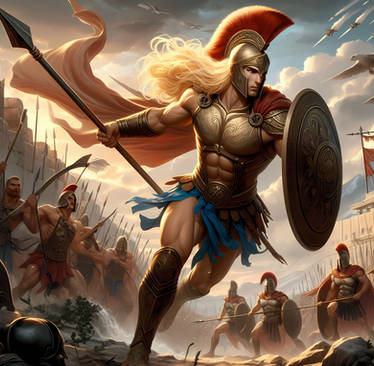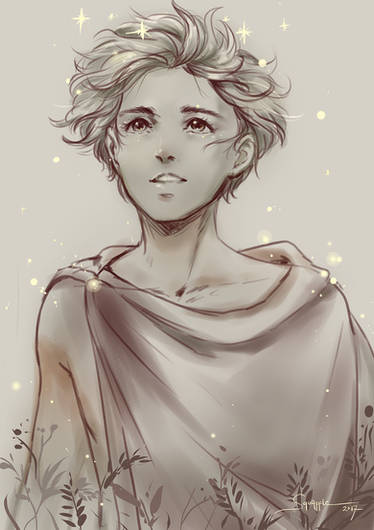Beyond the Binary: How Achilles and Patroclus Shatter Queer Stereotypes
The Song of Achilles by Madeline Miller reimagines one of the most famous Greek myths, the Iliad, inviting readers to explore the nuanced portrayal of gender norms that both honours the myth's essence but also challenges the traditional perspective on queer relationships. After delving into various interpretations of this novel and analyses of it, I have realised that their relationship, despite being narrated in a modernised manner, is still perceived through the traditional lens of gender roles in a relationship. Many are adamant about fitting the two characters, Achilles and Patroclus, into a notion of a typical heterosexual relationship wherein Patroclus has feminine traits and Achilles embodies masculine ones. Categorising the roles in this way, especially in modern times, is outdated for two reasons: one is that we are in the 21st century, where these roles are being challenged even in heterosexual relationships, and the other is how conveniently we have associated bravery and strength with masculinity while nurturing and healing are considered feminine qualities.
But let's entertain these gender notions for a moment. Still, I strongly believe that both Achilles and Patroclus possess both feminine and masculine traits. Let's explore this further:
Achilles, the son of a goddess, is special in every possible way, yet the duality of his character is key and portrayed beautifully in this book. He is introduced as a naive prince, unaware of his own powers, someone who seeks peace, avoids conflict, and finds solace with his companion, Patroclus. However, forced by circumstances, he had to take up arms. To the world, he is the great warrior, but in front of Patroclus, he reveals his most gentle self, with a heart so soft that after witnessing the killing of Agamemnon's daughter, he is left visibly shaken. This incident testifies to how the war and the hunger to be recognised for his prowess altered him.
It is the burden of being this hero that leads to his pride and inevitable downfall. But if we look beyond the warrior and explore the side that defines most of his life, one that is deeply human and complex, we will see an entirely different human being. His human side is visible in moments spent with his father, where he is a listener; with his companions, a friend; with Chiron, a curious student; and with Patroclus, vulnerable, loving, and, most of all, gentle. He confides in Patroclus for emotional comfort, allowing him to take the driving seat in their relationship and even listens to and follows his advice and pleas despite being perceived as the stronger partner. Even Achilles' protective side for him is not that of a warrior but almost of a nurturer, almost maternal, beautifully portrayed throughout the war. Moreover, Patroclus wanted him to be remembered as a beautiful man who loved playing Iyre and loved the arts. Whenever Patroclus describes Achilles, the word he uses the most is beautiful: a word traditionally associated with femininity, while his prowess as a warrior is so great that he blurs the lines between gender norms.
Patroclus, on the other hand, is perceived as the weaker of the two, with his nurturing qualities letting his masculine side be overshadowed. However, it is often ignored that Patroclus begins as a distant and shy child who accidentally kills another boy. He was exiled and stripped of all hope for a worthy life. A rejected prince with nothing to be recognised for, he was unsympathetic, cruel, even to Achilles, and distant from his peers. It was Achilles who brought out the empathetic and nurturing side of him. He learned gentility and selflessness from this great warrior, who is amusingly only known for the Trojan War.
However, Patroclus, known for his nurturing nature, is also the one who follows his love to war, fully aware of the doom that awaits them. He led the whole army and fought fearlessly against the Trojans when all others despaired. He stood up and killed the son of Zeus, who was only second to Hector. This act of taking on Achilles' role is not only sacrificial but a courageous gesture, traditionally associated with masculinity. Patroclus, trained by Chiron and raised alongside Achilles, is no stranger to combat. It must be remembered that he simply chooses healing over killing. The bravery is illustrated when he confronts Peleus about Achilles' hiding, stands up to Achilles and fights for his love with the Goddess herself, Thetis. Patroclus' death, only made possible after the intervention of Apollo, highlights his skills and bravery, which must not be overlooked by his nurturing nature or else it would defeat the purpose of the novel and the complexity of his character.
Ultimately, Achilles and Patroclus, despite displaying some gender-specific traits, defy all the stereotypes. They both exhibit traits traditionally associated with both femininity and masculinity, challenging not only the heteronormative roles but also creating a dynamic based on mutual love, respect, shared vulnerabilities, and a rejection of rigid binary roles. This modern retelling serves as a reminder that we understand the importance of not dividing roles according to societal expectations, but rather trying to find a ground where the partners involved in a relationship are happy and satisfied without being judged by outdated stereotypes. It's high time that we start viewing any romantic relationship through a different lens, where we are not confining them to a box for the sake of our own understanding and easy categorisation.





Comments
Post a Comment